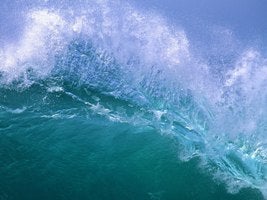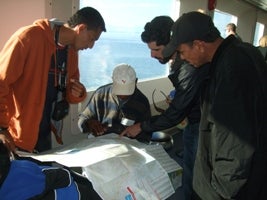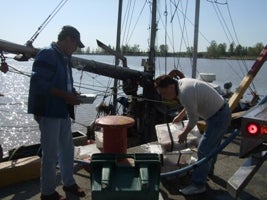Julie Wormser, New England Regional Director for the Environmental Defense Fund oceans program, writes about her attendance and NOAA Administrator Jane Lubchenco’s presence at the New England Fishery Management Council meeting on April 8th.
April 8, 2009, Mystic, CT —Sally McGee, Emilie Litsinger and I got to witness something pretty wonderful today. Jane Lubchenco came to the New England Fishery Management Council meeting to announce the immediate release of $16 million to the groundfish fishery to help move the fishery to “sector” catch share management by providing funding for cooperative research to help fishermen get through a tough fishing year with very strict limits on fishing effort.
This came on the heels of Monday’s announcement of a final Interim Rule for groundfish that was a significant improvement both over the draft rule and a threatened legislative alternative introduced by some members of the New England congressional delegation.
The meeting started at 8:30 am, with the room unusually full for that early hour. The previous days had been crackling with speculation around the region about the reason for her visit. After brief introductions, Dr. Lubchenco thanked everyone for allowing her the time to speak to them. She described the main components of the new fishing rules and then said that she came to the council meeting with two clear messages.
First, that NOAA would commit $16 million this year toward a new future for New England’s fisheries (in this case, groundfish, but also more broadly). Second, she put the room on notice—Council members, agency staff, industry and other stakeholders—that we all needed to step up and move away from crisis management toward a lasting solution—catch shares.
“We need a rapid transition to sectors and catch shares,” she explained. “Catch shares are a powerful tool to getting to sustainable fisheries and profitability. I challenge you to deliver on this in Amendment 16, to include measures to end overfishing. I will commit the resources to my staff to do their part to ensure Amendment 16 is passed in June.
Read More »
 By Julie Wormser, New England Regional Director – Environmental Defense Fund Oceans Program.
By Julie Wormser, New England Regional Director – Environmental Defense Fund Oceans Program.









 Federal regulators recently finalized rules to help regional fishery councils comply with new U.S. fisheries laws to end and prevent overfishing with “annual catch limits” and “accountability measures.” This means that tougher limits on fishing are coming, and Gulf fishery managers can take this opportunity to save fisheries and the multi-billion dollars in economic benefits they provide the region. Here’s what can be done:
Federal regulators recently finalized rules to help regional fishery councils comply with new U.S. fisheries laws to end and prevent overfishing with “annual catch limits” and “accountability measures.” This means that tougher limits on fishing are coming, and Gulf fishery managers can take this opportunity to save fisheries and the multi-billion dollars in economic benefits they provide the region. Here’s what can be done: The Gulf Council recently voted to consider adding all reef fish to the successful IFQ program already working for red snapper and coming on-line for grouper and tilefish in January. When implemented, it will be one of the largest and most modern and effective management systems in the U.S.
The Gulf Council recently voted to consider adding all reef fish to the successful IFQ program already working for red snapper and coming on-line for grouper and tilefish in January. When implemented, it will be one of the largest and most modern and effective management systems in the U.S. Ocean energy is a new frontier in efforts to meet the world’s ever increasing need to develop renewable energy sources. Last week,
Ocean energy is a new frontier in efforts to meet the world’s ever increasing need to develop renewable energy sources. Last week,  Several times a year, EDF takes a delegation of fishermen, policy makers and other leaders in the ocean conservation community and fisheries industry to British Columbia to see, first hand, an effective catch shares program at work. Last week, Larry Epstein, Ayelet Hines, Michael Clayton, and Nicanor Requena of the EDF Oceans program hosted a delegation of fisheries stakeholders from Belize on an international exchange to visit the B.C. groundfish fishery.
Several times a year, EDF takes a delegation of fishermen, policy makers and other leaders in the ocean conservation community and fisheries industry to British Columbia to see, first hand, an effective catch shares program at work. Last week, Larry Epstein, Ayelet Hines, Michael Clayton, and Nicanor Requena of the EDF Oceans program hosted a delegation of fisheries stakeholders from Belize on an international exchange to visit the B.C. groundfish fishery. Some of the fisheries managed by catch shares in the B.C. groundfish fishery have increased in value ten-fold as a result of healthier and improved fish stocks and habitat. During the conversations among B.C. and Belizean government managers, fishermen, and conservationists, the delegation learned how the B.C. catch share evolved and discussed lessons learned. In addition, the delegation visited the catch shares monitoring facility and observed the process of assessing and recording the catch at a dockside offload site.
Some of the fisheries managed by catch shares in the B.C. groundfish fishery have increased in value ten-fold as a result of healthier and improved fish stocks and habitat. During the conversations among B.C. and Belizean government managers, fishermen, and conservationists, the delegation learned how the B.C. catch share evolved and discussed lessons learned. In addition, the delegation visited the catch shares monitoring facility and observed the process of assessing and recording the catch at a dockside offload site.